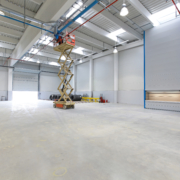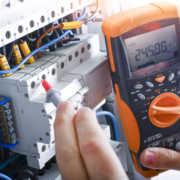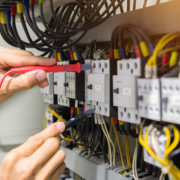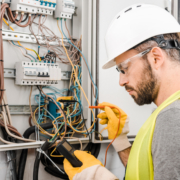Electrician for Commercial
What We Do as a Commercial Electrician and Installation Company
At Electrical Installation Services (EIS), we specialise in a wide range of commercial electrical projects. Our services cover the full scope of design, installation, and commissioning, including:
- Electrical Installations
- Electrical Relocation
- Electrical Testing
- Commercial Lighting
- Data Centres
- Data Cabling
- Audio-Visual Systems
With extensive experience across various commercial spaces and installations, we have completed projects in the following sectors:
- Offices
- Schools
- Hotels
- Warehouses
- Retail
- Bars and Restaurants
- Sports Facilities and Stadiums
- Listed Buildings
Our team is well-equipped to handle a wide array of electrical installations, ensuring we meet the specific needs of each commercial environment.
What Does a Commercial Electrician Do?
A commercial electrician is responsible for the installation, maintenance, and repair of electrical systems within commercial buildings. They focus on various areas of expertise, such as wiring, lighting, and power distribution. Commercial electricians work in a variety of environments, including office buildings, factories, schools, hospitals, hotels, and other public or private spaces.
In the UK, the two recognised awarding bodies for electricians are EAL and City & Guilds. To qualify as a fully certified domestic electrician, individuals must hold Level 3 certification and complete the AM2 assessment.
Relevant Qualifications for Commercial Electricians Include:
- Level 2: City & Guilds – Building Services Electrical Installation Route or EAL Intermediate Diploma in Electrical Installation
- Level 3: City & Guilds Level 3 Building Services Electrical Installation Route or EAL Advanced Diploma in Electrical Installation
Commercial electricians are also required to undertake further training to expand their expertise in more complex systems.
Additional Qualifications for Commercial Electricians:
- Level 3 NVQ Qualification
- Diploma in Electrotechnical Services (Electrical Maintenance)
- Level 3 Diploma in Installation of Electrotechnical Systems & Equipment
Commercial Electrician Daily Tasks Include:
- Installation, repair, and maintenance of electrical wiring for buildings, including lighting fixtures, circuit breakers, power outlets, and switches
- Connecting wires to support equipment such as computers or other technology devices
- Connecting utility power lines to electrical equipment in buildings
- Installing junction boxes and mounting hardware for lights, switches, and outlets
- Testing electrical circuits with a voltmeter or other testing devices to ensure proper functionality
- Making wire connections between terminals on switches, panels, and junction boxes
- Installation, repair, and maintenance of security systems and fire alarms
Looking to Hire a Commercial Electrician?
When hiring a commercial electrician, ensure they have the required qualifications and experience. A Level 3 NVQ and other industry-recognised certifications are essential, along with the ability to issue BS 7671 certificates. Additionally, always check reviews and case studies before making your final decision.
Further Tips for Hiring the Right Commercial Electrician:
- Look for an electrician with experience in commercial projects to ensure they are equipped to handle the unique challenges of your business setting.
- Ensure the electrician is insured and licensed, which provides protection for both parties in case of accidents.
- Ask for referrals from family and friends, as they may have previous experiences and recommendations.
- Obtain quotes from multiple electricians to compare prices and services, helping you find the best fit for your business.
Hiring a commercial electrician may seem daunting, but following these tips will simplify the process and ensure you find a reputable, professional electrician to meet your business needs. Your business’s electrical safety and reliability depend on it!
EICR Certification
EICR stands for Electrical Installation Condition Report. This test is designed to ensure that the electrical wiring in your building is safe and correctly installed. A qualified electrician will inspect all aspects of the electrical system, including equipment, switchgear, control gear, and fixed appliances. The inspection will also cover all conductors, cables entering or leaving enclosures, consumer units, circuit breakers, and Residual Current Devices (RCDs).
EICR tests must be conducted periodically to assess the safety of your fixed wiring. These tests were introduced as a preventative measure to reduce the risk of electrical fires and electric shock-related injuries.
How Often Should EICR Tests Be Conducted?
It’s recommended that EICR tests be carried out at least every 5 years. However, certain high-risk environments require more frequent testing, typically between 1 to 3 years. Below is a list of premises types and their testing requirements:
- Industrial Units – Every 3 years
- Places of Public Entertainment – Every 3 years
- Spa Hotels and Leisure Centres – Every 3 years
- Cinemas – Every 1 year
- Caravan Parks – Every 1 year
- Marinas – Every 1 year
- Petrol Stations – Every 1 year
Who Can Carry Out EICR Testing?
Electrical work is inherently hazardous, so it should always be carried out by a qualified professional. The individual conducting the EICR must have a solid understanding of electrical systems and demonstrate competency. The qualification for fixed wiring testing is a Level 3 in Periodic Inspection and Testing of Electrical Installations. Before hiring an electrician to perform EICR testing, ensure they hold the appropriate qualifications.
Are Commercial Landlords Responsible for Electrical Safety?
According to government-issued Electrical Regulations Guidance, landlords and property owners are responsible for organising EICR tests for their properties. Failure to comply with these regulations can result in fines of up to £30,000.
Landlords must ensure an EICR test is conducted before a tenant moves in. Any hazards identified during the test must be rectified before the tenant takes possession. This regulation applies to both commercial and residential properties. The standard is a 5-year testing interval, but if the inspector recommends more frequent testing, the landlord must follow this advice.
Legal Responsibilities of a Commercial Landlord
Commercial landlords are subject to similar electrical safety requirements as private landlords. The Landlord and Tenant Act 1985 mandates that the landlord must ensure the property is safe before the tenant moves in and maintain the electrical system in a safe condition throughout the tenancy. It’s important to note that these terms can vary depending on the lease agreement, and in some cases, the tenant may be responsible for maintaining the electrical system.






